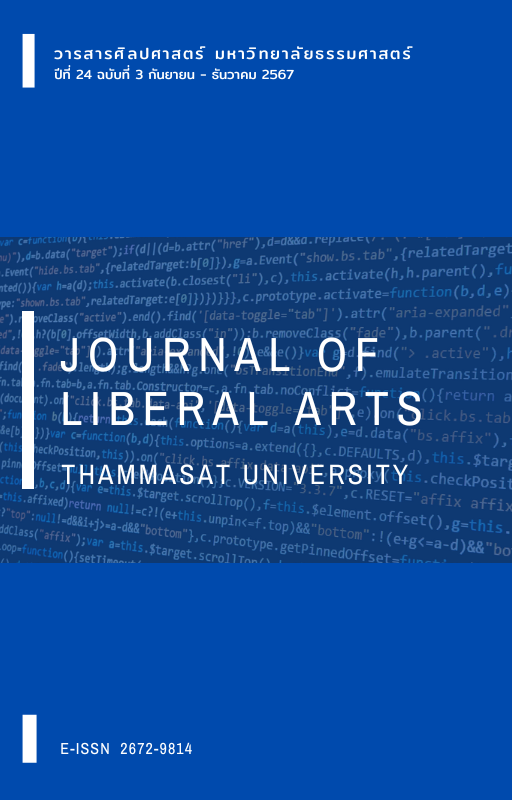Disclaimers in Thai: A Mitigating Device or Direct Speech Act?
Main Article Content
Abstract
Language serves as a crucial tool for fostering and enhancing good relationships among individuals. It also signifies the user’s endeavor to mitigate potential problems that could impact interpersonal connections. Currently, the use of disclaimers by Thais is a prevalent linguistic practice observed across various media platforms like dramas, television shows, radio programmes, and social media. However, using disclaimers in Thai has been noted to evoke diverse perceptions and effects. Hence, this study aims to explore the functions of two types of disclaimers preceding criticism utterances which are “I don’t mean to…, but…” and “Don’t blame me for…, but…”. Through semi-structured interviews with 30 Thai participants from different social backgrounds, the research findings reveal the multifaceted functions of disclaimers in Thai. These functions include, for instance, mitigating threats, cautioning the hearer about potential negative outcomes, and distancing speakers from the responsibility for any adverse consequences resulting from their criticism utterances. Moreover, the disclaimers in Thai can also be used to emphasise the speakers’ genuine communicative intents, contingent upon linguistic and social contexts, particularly the language user’s role in the immediate interactional situation. The present study highlights the constraints of the existing theories and data collection methodologies employed in examining and elucidating the use of disclaimers in the Thai language.
Downloads
Article Details

This work is licensed under a Creative Commons Attribution-NonCommercial-NoDerivatives 4.0 International License.
References
ซูม. (12 กุมภาพันธ์ 2561). คนไทยกับ “อารมณ์ขัน” หน้าสิ่วหน้าขวานก็ขันได้. ไทยรัฐออนไลน์. https://www.thairath.co.th/news/politic/1201263
พิมลพรรณ อิศรภักดี และ ฐิตินันทน์ ผิวนิล. (2561). หน่วยที่ 12 ครอบครัวในวิถีไทย. ใน มหาวิทยาลัยสุโขทัยธรรมาธิราช, เอกสารการสอนชุดวิชาวิถีไทย หน่วยที่ 9-15 (น. 1-82). สำนักพิมพ์มหาวิทยาลัยสุโขทัยธรรมาธิราช.
วัฒนา วงศ์เกียรติรัตน์ และ จิตรา วีรบุรีนนท์. (2559). หน่วยที่ 8 ชุมชนชนบท. ใน มหาวิทยาลัย สุโขทัยธรรมาธิราช, เอกสารการสอนชุดวิชาสังคมและวัฒนธรรมไทย หน่วยที่ 8-15 (น. 1-37). สำนักพิมพ์มหาวิทยาลัยสุโขทัยธรรมาธิราช.
วิภาพร กล้าวิกย์กิจ. (2548). อารมณ์ขันในข้อความสั้นสำเร็จรูป [สารนิพนธ์ปริญญามหาบัณฑิต มหาวิทยาลัยศรีนครินทรวิโรฒ]. สำนักหอสมุดกลาง มหาวิทยาลัยศรีนครินทรวิโรฒ. http://thesis.swu.ac.th/swuthesis/Tha/Wipaporn_G.pdf
สาคร สมเสริฐ. (2562). หน่วยที่ 2 โลกทัศน์ไทยในมิติทางสังคม. ใน มหาวิทยาลัย สุโขทัยธรรมาธิราช, เอกสารการสอนชุดวิชาโลกทัศน์ไทย หน่วยที่ 1-8 (น. 1-60). สำนักพิมพ์มหาวิทยาลัยสุโขทัยธรรมาธิราช.
สำราญ ผลดี. (2561). ไทยศึกษา. สำนักพิมพ์แห่งจุฬาลงกรณ์มหาวิทยาลัย.
อำนาจ ปักษาสุข และ อนุชิต ตู้มณีจินดา. (2566). การกล่าวออกตัวและความสำคัญของข้อมูลการตระหนักรู้ทางอภิวัจนปฏิบัติศาสตร์. วารสารศิลปศาสตร์, 23(3), 659-685.
Abdi, R. (2012). Smoothing the rough edges: Towards a typology of disclaimers in research articles. Pragmatics, 22(3), 355-369.
Ajayi, T. M. (2022). Metapragmatic disclaimers in Yoruba discursive interactions. Southern African Linguistics and Applied Language Studies, 40(2), 212-226. https://doi.org/10.2989/16073614.2022.2049834
Bongelli, R., Zuczkowski, A., & Riccioni, I. (2023). The Italian epistemic disclaimer Non so [I don’t know] in a corpus of gynaecological interactions. Languages, 8(4), 226. https://doi.org/10.3390/languages8040226
Braun, V., & Clarke, V. (2006). Using thematic analysis in psychology. Qualitative Research in Psychology, 3(2), 77-101.
Brown, P., & Levinson, S. C. (1987). Politeness: Some universals in language usage. Cambridge University Press.
Caffi, C. (2007). Mitigation. In M. Sbisà & K. Turner (Eds.), Pragmatics of speech actions (pp. 257-286). De Gruyter Mouton.
Culpeper, J. (1996). Towards an anatomy of impoliteness. Journal of Pragmatics, 25, 349-367.
El-Alayli, A., Myers, C. J., Petersen, T. L., & Lystad, A. L. (2008). “I Don't mean to sound arrogant, but...”: The effects of using disclaimers on person perception. Personality and Social Psychology Bulletin, 34(1), 130-143.
Ercan, G. S. (2019). “Ama (But)” as a disclaimer and its functions in Turkish daily discourse. In V. Krystev, R. Efe, & E. Atasoy (Eds.), Theory and practice in social sciences (pp. 308-317). St. Kliment Ohridski University Press.
Fraser, B. (1980). Conversational mitigation. Journal of Pragmatics, 4(4), 341-350.
Fraser, B. (1990). Perspectives on politeness. Journal of Pragmatics, 14(2), 219-236.
Grice, H. P. (1975). Logic and conversation. In P. Cole & J. Morgan (Eds.), Syntax and semantics (Volume 3, pp. 41-58). Academic Press.
Hewitt, J. P., & Stokes, R. (1975). Disclaimers. American Sociological Review, 40, 1-11.
Hongladarom, K. (2007). “Don’t blame me for criticizing you...”: A study of metapragmatic comments in Thai. In W. Bubliz & A. Hübler (Eds.), Metapragmatics in use (pp. 29-47). John Benjamins.
Liu, X. (2022). An interpersonal metapragmatic account of the Chinese formulaic disclaimer “bushi wo V (P) ni” [Doctoral dissertation, University of Antwerp]. UAntwerpen Institutional Repository (IRUA). https://hdl.handle.net/10067/1910360151162165141
Nesbit, R. J., & Watling, D. (2019). The role of audience familiarity and activity outcome in children’s understanding of disclaimers. British Journal of Developmental Psychology, 37(2), 230-246.
Overstreet, M., & Yule, G. (2001). Formulaic disclaimers. Journal of Pragmatics, 33(1), 45-60.
Parvaresh, V. (2016). Metapragmatic pragmemes. In K. Allen, A. Capone, & I. Kecskes (Eds.), Pragmemes and theories of language use (pp. 521-535). Springer.
Ran, Y. (2015). Metapragmatic negation as a rapport-oriented mitigating device. Journal of Pragmatics, 84, 190-203.
Shapiro, D. L., & Bies, R. J. (1994). Threats, bluffs, and disclaimers in negotiations. Organizational Behavior and Human Decision Processes, 60(1), 14-35.
Spencer-Oatey, H. (2011). Conceptualising ‘the relational’ in pragmatics: Insights from metapragmatic emotion and (im)politeness comments. Journal of Pragmatics, 43(14), 3565-3578.
Stokes, R., & Hewitt, J. P. (1976). Aligning actions. American Sociological Review, 41(5), 838-849.
Tayebi, T., & Parvaresh, V. (2014). Conversational disclaimers in Persian. Journal of Pragmatics, 62, 77-93.
Toomaneejinda, A. (2018). An exploratory study of expressing disagreement in ELF academic group discussion (Order No. 13830804) [Doctoral dissertation, Lancaster University]. ProQuest Dissertations and Theses Global.
Toomaneejinda, A., & Harding, L. (2018). Disagreement practices in ELF academic group discussion: Verbal, nonverbal and interactional strategies. Journal of English as a Lingua Franca, 7(2), 307-332.
van der Meij, S., Gosen, M., & Willemsen, A. (2024). ‘Yes? I have no idea’: teacher turns containing epistemic disclaimers in upper primary school whole-class discussions. Classroom Discourse, 15(1), 1-23. https://doi.org/10.1080/19463014.2022.2103008
Warren, P. (2013). Introducing psycholinguistics. Cambridge University Press.
Watling, D., & Banerjee, R. (2012). Children’s understanding of disclaimers. Social Cognition, 30(1), 18-36.
Yang, K. (2021). Disclaimer as a metapragmatic device in Chinese: A corpus-based study. Journal of Pragmatics, 173, 167-176.


